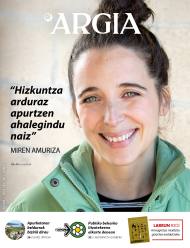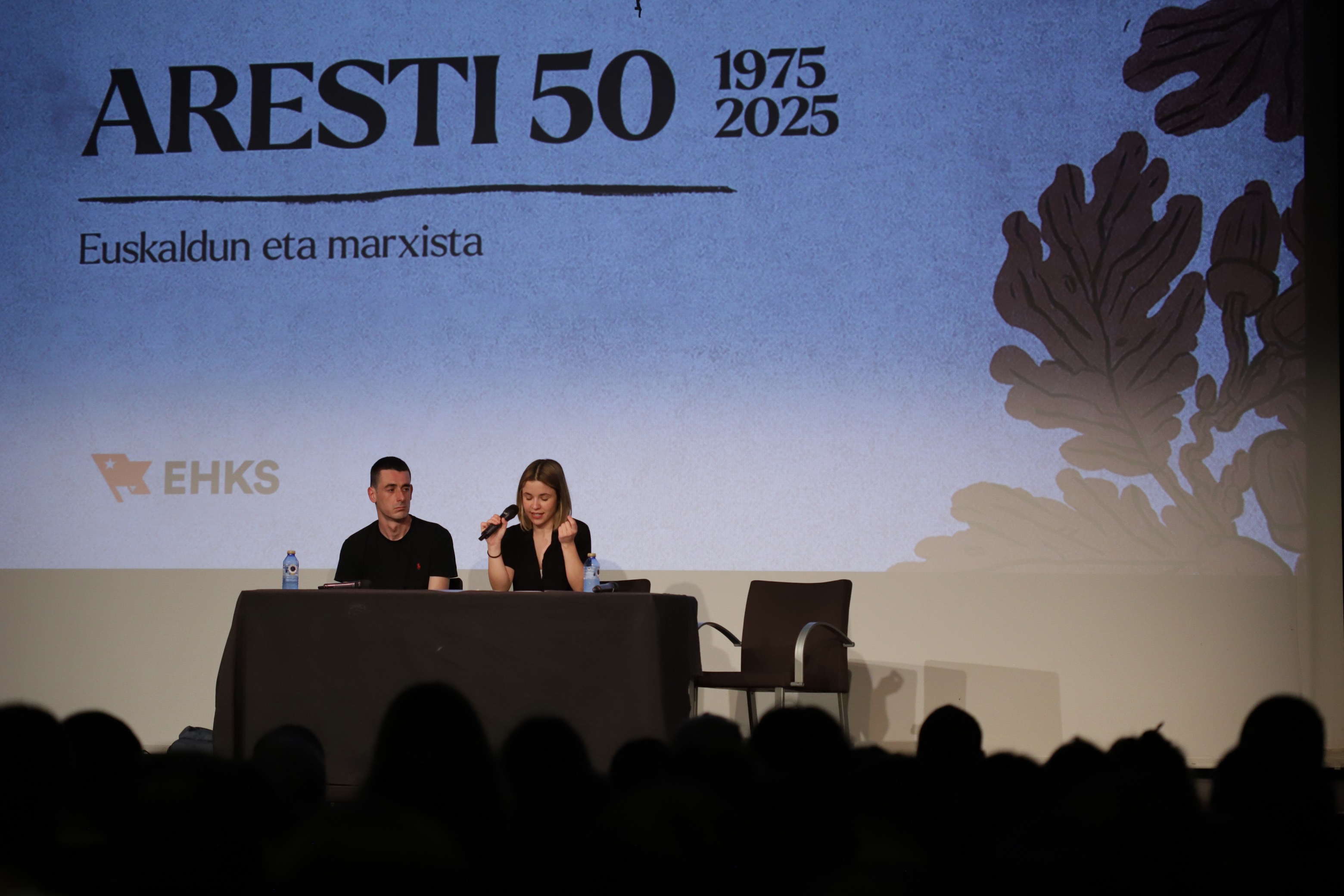"As we identified and denounced those outside so clearly, we've been losers with those in the house."
- Jon remembers in his novel Pleibak (Susa, 2024) the year he repeated DBH4. The elders moved to the institute in Durango, where he stayed in the classroom of Polly, his neighbor. Childhood was travelled along the road that linked Jone's farmhouse with Polly's chalet, on a round trip, endless but inseparable. Until, from September to June, the discussion between the two gradually developed, but quickly and definitively, without them knowing what had happened.

Five years ago you were in the first novel of Basa (Elkar, 2019). It was said that he was looking at old age. [Pleibak in adolescence]. Where does the desire to focus at that time come from? The
core of the book was not the desire to tell this story or to address this issue. The hardest thing was to put into practice a certain literary language, as close as possible to the oral language. Itziar Ugarte proposed for the counterpart “the language that is eaten dirty” and describes well what he wanted to look for: a language that has expressive strength, close to the oral and linked to the juvenile environment. I came to the characters looking for the voices that were going to work in that record, and from there also to the context of our adolescence.
In fact, one of Pleibak's most striking features is the language that uses the narrative voice. How would you define it?
I would like to stress, first of all, that this is a set of decisions taken for this particular book, not a general criterion on literary language. Normally, when we talk about narrative, we explain other options and not so much those related to language. But these elections are always there. For me, it's important to find a record that best fits the story you're telling, to make concrete decisions. Because language is not just meaning, meaning, meaning, phrase and paragraph. It also has a soundtrack effect and lots of additional information on each word.
In this case, the criterion has been to seek as much lexical precision as possible. On that road I realized that, to say what I meant, I often went through Spanish or Biscayan. So, in the lexicon the criterion has been to be flexible, and to use words that come from Spanish if the translations in Spanish and in French are similar, or if they are shorter or stronger than the translations in Euskera: brilliant, hortero, liminal… Therefore, I decided to be flexible with the dictionary. On the contrary, I have been demanding in the syntax: I have attached great importance to the care of the structures in Basque. As Uxue Alberdi remarked in Hetero’s interview at ARGIA, you can break the language of responsibility or irresponsibility. I have tried to do it with caution, and where I have broken it, acting with conscience, thinking that we have more to gain than to lose.
"Many of us have had the first 'partner relationship' with a friend, although we don't identify it as such."
As for sonority, Andrea Abreuren Panza de Burro (Barret, 2020) is a good example. The others, when we read it, wondered if it was possible to do such a thing in Basque. I believe that if we said in Basque the way it is written, it would be closer than the Basque dialect, the kitchen: written as has been said, with words attached and meals, without the orthographic standards… Such boredom would be to the detriment of the Basque, on the one hand, communicatively, because the language of Abreu Tenerife is closer to the laboratorial language of a vasco-speaker from Zaragoza. And, on the other hand, because in order to contain the ruptures, the structure has to be strong: in our case, since we do not have a strong linguistic structure, but to unite would divide the Basque community. Does this mean that we don't have room for experimentation? No. I've tried to play with that. I have searched for the game in concrete things, for example, by writing the Spanish brands or phrases that we have very own. I have tried to find the means to Euskera batua, without losing the axis of the burden and global understanding of the text.
.jpg)
Panza de burro is part of a trend dedicated to adolescence that has occurred in recent years in Spanish literature. Pleibak may also be affected. How would you say that the literary movements that are in contact with ours fall into the Basque literary system?
In my environment, we all read literature in Spanish, Anglo-Saxon and also in French. And I would say that we're very open to picking up what's created in other literatures.
On the other hand, I find it difficult to generalise, but it seems to me that until recently the story we have been able to tell of our reality has been very rigid: the parts we had to distinguish, the white and the black... And in order to survive, we've come here in the story that we've created about ourselves, with its advantages and drawbacks. But the context has been changing and expanding, and I hope that the literary narrative will be even more diverse in five years' time, in ten years' time. Now, just as we've begun to problematize other issues, to consider other conflicts as politicians and to name things, that approach will also affect fiction, and the list of issues that we consider important or legitimate to write will be expanded.
On the other hand, it is no coincidence that adolescence generates so much interest, because at that moment we are building and defining ourselves more than ever. What is the shape of age in the book? The
abovementioned and current books are also often regarded as initiating. There's a transition: the characters are maturing, but they still carry the tail as a child hanging. There they are, halfway. It is a very intense and, in my opinion, exciting time. We've all been there, we've all been that being, wearing a T-shirt cut for high school and some trendy panolites, and while still sleeping with the children's pajamas.
It is a time of great contrast, in oneself, in the body, as the environment conditions you… In our case, all our classmates and classmates were in the same school from 6 to 16 years old, all supposedly under the same conditions. But then I have seen to what extent we were each marked by our situation. At the age of 14, you do not realize that the cards are separated beforehand, at least when your cards are quite good; according to your original socioeconomic and cultural extract, you will have resources, tastes, affinities… Meanwhile, you are building your being, looking inwards, but also in interaction with others, looking at the group, whom you choose and who you choose… Everything is conditioned. Adolescence is a stage that bursts on all sides and allows us to search for and deepen the complexity within the bosom.
However, the Pleibar has been working since today: Jone's adult gaze narrates that adolescence of the 2000s.
I think bringing the voices of children or teenagers to write has some risks: it can end up making very naive speeches or, on the contrary, putting in the mouth of a younger character things that an adult would say and think about. The adjustment of this voice, which I found more difficult, seemed more appropriate for distance.
On the other hand, it allowed me to have a more critical view of what had happened. This era has several layers that I see different since today, and I wanted to make a second reading. Yes, the risks of making a nostalgic reading being conscious. I tried to avoid it. I think one of the greatest dangers of nostalgia is the idealization of the past. In recent years, and especially since the pandemic, in which apocalyptic speeches have been highlighted, it seems that the world will always be equal or worse than now and, therefore, all of the above was better. And that's not the case: both the old and the present have their lights and their shadows. In view of this, I have tried to be as accurate as possible in the facts and as objective as possible in the descriptions, to broaden the path of the problem of some things.
The story begins by saying that Polly is the one who would write the book, pulling the bill off the norm. In fact, the focus will be taken by the voices we underestimate: Beda who does not enter feminism but takes care of life, Jone who goes to the demonstrations but does not invite the gaztetxe… Sometimes it causes itching.
I've tried to make self-criticism. In adolescence, relationships are broken for many reasons. In this case, Jone's gaze makes us see again and again that, at that time, we threw in the same bag all those who were not militants, without taking into account that maybe they were not there for fear, for lack of information, for lack of interest, for thinking differently. And now, looking back, it's obvious, even with the friends that were so close up until then, what we put in value from one day to the next and what we take away from it, and the chasm that it generated in the groups of friends.

Relations with men and the imposition of the cysheteropatriarchy also permeate Polly and Jone.
Yes, and that imposition has many layers, which is why I have endeavoured to define it and make it as complex as possible. They both go through the same ideology, but in the case of relationships, for example, they project differently what they want. Do you remember how the flashlights that projected the images were? You could change the cover and give different figures. Well, in the case of Jone and Polly, it's the same thing: they have the same lantern, but the projections are different. Jon seeks in Adri someone who generates extreme emotions, a guy who offers him an escape route to get away from everything he presses on him. Polly, for his part, is relocated in a demonstration and, a second from his encounter with Etxeba, represents the possible perfect militant life of both.
I have also tried to make self-criticism, to identify more easily violence and power relations when they occur outside the home or in non-politicized settings. Local boys are easily left when they talk about the guy they've paid a friend to do a blowjob, or when those in the dance group, half jokingly, put a sword on their leg. At home it's cost us more. Chancellor to a fellow who's putting up placards or making shifts? What's that like? I think we have come to that reading later. And I also wanted to tell you that: as we identified and denounced those outside so clearly, those in the house with whom I'm sorry we've been.
"I've tried to break the language responsibly and, where I've broken it, act mindfully, thinking that we have more to gain so than to lose."
The relationship between the two protagonists is loving and maintains its full range of emotions. It's as if they're building each other looking at each other and reacting to each other. I've given a lot
of importance to the fact that when you build the characters, you don't fall into the opposition a hero antihero. We tend to understand things in dichotomies: the farmhouse and the street, the local and the gaztetxe, Polly and Jone… And I don’t want the two characters and the environment to be understood like this. They're more complex than that, and I imagine them in a chase. Jon and Polly have a shared world and spaces that don't share so much. They both love each other, they have hurt each other, there is no “good” and “bad”.
On the other hand, many of us have had our first “partner relationship” with a friend, although we have not identified it. There has been falling in love, idealization, mutual knowledge, rapprochement, the desire for exclusivity, jealousy, rupture and grief. With all its phases. That was the case for me with Jone and Polly. The book is covered by a kind of unending duel layer. In recent years, there has been a growing number of critical reflections on friendship, but I have at least had many dynamics unnamed until recently. The book mentions how at one point we lacked the words to carry out and understand those ruptures. Words, or movies, or songs… All that imaginary we have had to project relationships as partners, without going into discussing whether it was healthy or not.
In addition to what we have on paper, Pleibak will also give way to other stories and songs, as along with MICE and other bertsolaris you are doing performances that start from the book. How did these actions emerge?
The format for Berriz’s presentation, in itself. What is said in the book gives him another life, other voices and looks add layers. And by the way, we create places for singing. As you say in Gorge Contra, beyond being invited to the party, this is to create our own party. For me, writing this book has been creating a party, with our music, with our references, with our language… Pleibak is our own party.
Now that everyone has become more Franciscan than the Pope, it’s worth remembering our unsurpassed classics. There was one in the 17th century, his grace was Arnaut Oienart. And since we can’t immerse ourselves in all his works, today we will praise O.ten youth in... [+]
Aurreko tertuliako galderari erantzuteko beste modu bat izan zitekeen, akaso modu inplizituago batean, bigarren solasaldi honetako izenburua. Figura literarioaz gaindi, pertsonaia zalantzan jartzeko, edo, kontrara, pertsonaiaren testuingurua ulertzeko saiakera bat. Santi... [+]
Astelehen honetan hasita, astebetez, Jon Miranderen obra izango dute aztergai: besteren artean, Mirande nor zen argitzeaz eta errepasatzeaz gain, bere figurarekin zer egin hausnartuko dute, polemikoak baitira bere hainbat adierazpen eta testu.
Martxoaren 17an hasi eta hila bukatu bitartean, Literatura Plazara jaialdia egingo da Oiartzunen. Hirugarren urtez antolatu du egitasmoa 1545 argitaletxeak, bigarrenez bi asteko formatuan. "Literaturak plaza hartzea nahi dugu, partekatzen dugun zaletasuna ageri-agerian... [+]
1984an ‘Bizitza Nola Badoan’ lehen poema liburua (Maiatz) argitaratu zuenetik hainbat poema-liburu, narrazio eta eleberri argitaratu ditu Itxaro Borda idazleak. 2024an argitaratu zuen azken lana, ‘Itzalen tektonika’ (SUSA), eta egunero zutabea idazten du... [+]























